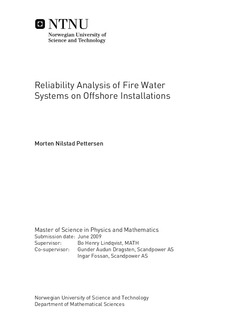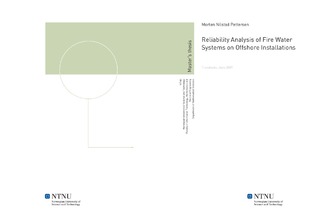| dc.contributor.advisor | Lindqvist, Bo Henry | nb_NO |
| dc.contributor.advisor | Dragsten, Gunder Audun | nb_NO |
| dc.contributor.advisor | Fossan, Ingar | nb_NO |
| dc.contributor.author | Pettersen, Morten Nilstad | nb_NO |
| dc.date.accessioned | 2014-12-19T14:00:26Z | |
| dc.date.available | 2014-12-19T14:00:26Z | |
| dc.date.created | 2014-06-09 | nb_NO |
| dc.date.issued | 2009 | nb_NO |
| dc.identifier | 722895 | nb_NO |
| dc.identifier | ntnudaim:4533 | nb_NO |
| dc.identifier.uri | http://hdl.handle.net/11250/259287 | |
| dc.description.abstract | The background for this thesis is a change in the guidelines provided by the Norwegian petroleum industry regarding design of active and passive fire protection at offshore platforms. Now, it is possible to take into account that deluge systems have a cooling effect for process piping/equipment in the event of a fire. A deluge system is similar to a sprinkler system, except that the nozzles are open and dry upstream because a valve separates the water filled ring main from the nozzles. This allows high velocity suppression of fire water. By including the effect of deluge, passive fire protection may be designed taking into account that the deluge will reduce the heat load during a fire.In order to consider the cooling effect of deluge, proper documentation of the effect of deluge as well as on the reliability of the fire water supply system must be presented. This thesis intends to develop guidelines for how to document the reliability of such systems. A case study of the fire water system at an offshore platform (made anonymous and called Alfa) is performed to demonstrate the reliability analysis method. The analysis of the Alfa platform reveals an availability of the deluge system of 98.92 %. OLF 070 states that the fire water supply system shall be in compliance with a SIL 2 demand. Hence, the probability of failure on demand shall fulfill 0.001≤PFD≤0.01. The analysis results show that the PFD is on the upper limit of this demand. However, it is expected that the real PFD is higher than this estimate because failures of blocking of nozzles are not considered due to lack of data sources.The analysis of the Alfa platform involves a fault tree analysis with both qualitative and quantitative interpretation. The quantitative approach consists of minimal cut set analysis, importance analysis and sensitivity analysis. The analysis shows that the fire water systems unavailability is most dependent on the reliability of the deluge valves. The deluge valves constitute 95.5 % of the total unavailability. A study to improve the reliability of the valves may be appropriate to improve the system reliability. In addition, it is shown that by designing fire areas that depends on one deluge valves instead of two decreases the system unavailability to about 50 % of the original unavailability.A data dossier is developed for the quantitative analysis of the Alfa fire water system. The work revealed lack of reliable generic data sources as well as reliable test data. The main challenges was to estimate reliability parameters for the deluge valves, the logic nodes, hydraulic systems in addition to blocking of nozzles due to corrosion and marine fouling.According to the operator, there are problems with the interpretation of test data due to problems with test routines. Since it is important that the fire water system is available on demand at all times, it is necessary to perform active maintenance immediately if a failure occurs. Hence, it happens that operators repair the failures and do not register this as a failure in the maintenance database. This implies that the number of failures in the test data is below the real values. The demand for reliable data sources on fire water systems is expected to increase due to the new regulations. This report suggests that a follow-up project should focus on developing a fire water system data dossier that can be used in similar reliability analyses. The ambition should be to quality assure the available data and to use the test data from companies operating on the Norwegian Continental Shelf to develop estimates to the components mentioned above where there are no available estimates. | nb_NO |
| dc.language | eng | nb_NO |
| dc.publisher | Institutt for matematiske fag | nb_NO |
| dc.title | Reliability Analysis of Fire Water Systems on Offshore Installations | nb_NO |
| dc.type | Master thesis | nb_NO |
| dc.source.pagenumber | 114 | nb_NO |
| dc.contributor.department | Norges teknisk-naturvitenskapelige universitet, Fakultet for informasjonsteknologi, matematikk og elektroteknikk, Institutt for matematiske fag | nb_NO |

